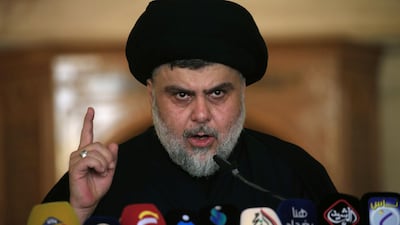Iraqi Shiite cleric Moqtada Al Sadr called on Tuesday for the swift formation of a government, following a turbulent month of widening political rifts over key ministerial posts.
Lawmakers last month confirmed 14 out of the 22 posts that Prime Minister Adel Abdul Mahdi initially presented. Yet, eight ministers, including the key defence and interior posts, remain vacant.
Parliament was initially set to vote on the remaining ministers earlier this month but the vote was continuously delayed due to disagreements over nominees.
Mr Al Sadr said that he will not approve any candidate that is affiliated to the country’s political elite.
“I urge the prime minister to quickly fill the cabinet posts that are still vacant, except for the defence and interior position,” the cleric said on Twitter.
The cleric said that he will only support independent candidates for the key posts. He proposed that the premier must choose military candidates who led Iraq’s three-year battle against ISIS.
Earlier reports had suggested that Mr Al Sadr has pressured the parliament to postpone its vote due to internal differences over who should be selected.
“I am not the cause for the delay of the cabinet formation but of its postponement,” Mr Al Sadr said.
The influential cleric's statement comes as Iraq’s parliament delayed a session initially scheduled for Tuesday, November 27, until next week to approve the remaining eight candidates for Mr Abdul Mahdi’s cabinet.
The premier was appointed to his position in early October to form a ‘technocratic’ cabinet but political jockeying has intensified in recent weeks as competing regional patrons vie for influence.
Parliament's session is officially postponed to next Tuesday.
"This is a bad start for the prime minister, which proves his weakness," Sarkawt Shams, an MP in Baghdad for the New Generation party said on Twitter.
Sunni groups in parliament are not agreeing on which candidate to nominate for the post of defence minister.
Meanwhile, Mr Al Sadr has rejected the premier's nomination of Falah Al Fayyad, former national security adviser, for the post of interior minister.
“We are seeing a situation where the premier has promised a technocratic government that wasn’t going to be beholden to political party leaders and yet he has put in names such as Fuad Hussein as minister of finance and others which is seen as a problem,” Michael Rubin, resident fellow at the American Enterprise Institute told The National.
“The way that horse trading occurs in Iraqi politics is there no accountability for party leaders because it’s the same leaders that distribute the patronage,” Mr Rubin said.
Mr Abdel Mahdi’s new government will not only deal with the daunting task of rebuilding the war-torn country after a devastating war against ISIS, but he will need to solve the country’s economic crisis, power and water shortages as well as tackle unemployment.
An attempt to heal ethnic and sectarian tensions will also be challenging for Mr Abdul Mahdi.

